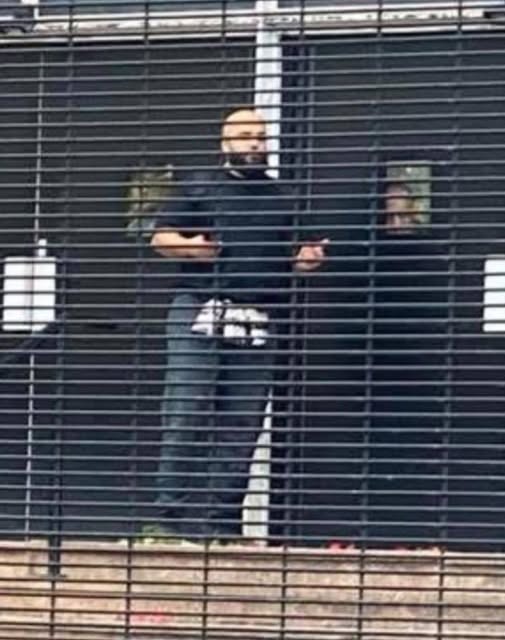MANCHESTER, UK – A brutal attack outside Heaton Park Hebrew Congregation in Manchester on Yom Kippur, the holiest day in the Jewish calendar, has left four people wounded and the attacker dead. The horrific event unfolded this morning, with a man ramming his car into pedestrians and subsequently stabbing worshippers outside the synagogue. The attacker was shot dead by armed officers, bringing the terrifying incident to an end, but not before significant damage had been done.
The Attack and Immediate Response
The attack began shortly before 10 a.m. on the morning of October 2, 2025, when a car rammed into a group of pedestrians gathered outside the synagogue. The driver then exited the vehicle and began stabbing those in the vicinity. Police were quickly dispatched to the scene, and within moments, the area was declared a major incident. Armed officers from Greater Manchester Police were on-site to respond to the attack, and within minutes, the suspect was shot dead by law enforcement.
Four victims were injured in the assault: one was stabbed, while the others were mowed down by the car. The individuals, who have not yet been identified, were quickly transported to nearby hospitals for treatment. While their conditions remain undisclosed, one of the victims is understood to be in critical condition. The attacker, whose identity has also not been fully revealed, was reportedly wearing what appeared to be an improvised explosive device (IED) belt at the time of the assault, though this was not confirmed until after the police’s swift intervention.
Operation Plato: Emergency Response to Terror Threat
Given the nature of the attack, which involved both a car and a knife, the police launched Operation Plato, the UK’s emergency response to marauding terror attacks. This protocol is designed to respond to scenarios in which roaming killers or active assailants pose a serious threat to the public. The decision to activate Operation Plato is not taken lightly and underscores the severity of the situation.
While the immediate threat has been contained, and the suspect is dead, authorities are continuing to investigate the full details of the attack. Police have not yet provided further details on whether the attacker was acting alone or had any accomplices. The nature of the assault, coupled with the suspected IED belt, has prompted heightened concern about the possibility of a larger coordinated attack, though this has not been confirmed.
Political Climate and the Rising Threat of Antisemitism
This attack has drawn attention to the increasing prevalence of antisemitism, particularly in the context of protests and demonstrations that have become more common in recent years. Many point to the growth of antisemitic rhetoric, often seen in pro-Palestinian marches, social media platforms, and political discourse, as contributing to an environment where hate can flourish.
In response to the incident, political leaders have condemned the attack in the strongest terms, but many have also pointed out that the climate of hatred that allowed this tragedy to unfold has been nurtured over time. From calls for a “free Palestine” to chants of “From the river to the sea” – slogans often associated with violent antisemitism – these phrases have found their way into protests across the UK, and some have even been endorsed by political figures.
“We unequivocally condemn this act of violence, and our thoughts are with the victims and their families,” said a statement from the local council. “But we must also acknowledge that this act of violence was the result of years of unchecked hate speech, online rhetoric, and dangerous political discourse that has been allowed to fester unchecked on our streets and campuses.”
The Role of Antisemitic Rhetoric in Encouraging Violence
The rise in violent antisemitic attacks cannot be understood in isolation. Mental health professionals and political analysts have noted that the continued proliferation of antisemitic rhetoric is fueling this climate of hate. Political figures, especially those on the far left, have repeatedly used inflammatory language such as “genocide” when discussing Israel’s actions. While legitimate criticism of any country’s policies is a vital part of democratic discourse, when such language is weaponized, it can lead to the kind of violence seen today.
Reports have surfaced that the attacker was inspired by antisemitic hatred and believed to have been radicalized through exposure to inflammatory political discourse. Authorities are looking into whether the individual had any prior criminal or extremist associations. As investigations continue, there is growing concern that similar attacks could occur if this growing culture of hate is left unchecked.
The Impact on the Jewish Community
The Jewish community in Manchester and across the UK is reeling from the attack. On Yom Kippur, when worshippers gather in prayer and reflection, to have such a brutal attack unfold outside a synagogue has struck at the heart of the community. Local leaders have expressed shock and sorrow over the violence, while also calling for more robust measures to combat antisemitism and protect Jewish institutions.
“We are deeply concerned by the violence that has unfolded today, but it is also a wake-up call for all of us,” said a community leader from Heaton Park Hebrew Congregation. “We must stand together and fight this rising tide of hate. This cannot be allowed to continue.”
The community’s response has been one of unity, with vigils planned in the coming days to honor those who were injured and remember the victims. Flowers, candles, and prayers have already been left at the entrance to the synagogue, as the city of Manchester comes together to mourn and heal.
Calls for Stronger Action Against Hate
The attack has also reignited calls for stronger actions against antisemitism in the UK. Activists and community leaders are demanding that the government take immediate action to address the rise in hate speech and violent extremism. They argue that the rhetoric used by certain political factions, particularly those sympathetic to extremist ideologies, has emboldened individuals to carry out attacks like the one in Manchester.
“The government must draw a clear line: protests with antisemitic chants or terror glorification are not ‘free speech’ but incitement,” said one commentator. “It is time for Britain to confront this problem head-on. If we do not act now, we will only see more tragedies like this unfold.”
Conclusions and Future Measures
As investigations continue into the synagogue attack, law enforcement agencies are working to piece together the motivations behind the crime. The UK’s response to this attack must go beyond words and focus on addressing the systemic factors that allow antisemitism to proliferate unchecked in political discourse, social media, and public demonstrations.
The attack outside Heaton Park Hebrew Congregation should serve as a moment of reflection for the UK, as the nation faces a crossroads in how it handles hate speech and the safety of its Jewish citizens. For the Jewish community, it is a painful reminder of the dangers that exist when hate is allowed to flourish unchecked.
Support for the Victims and the Jewish Community
Support for the victims of the attack and the wider Jewish community in Manchester has already begun, with fundraising efforts underway to help those affected. Authorities are urging the public to come together in solidarity and ensure that hate and violence do not define the future of the Jewish community in the UK.
As the investigation continues, the focus now shifts to finding the root causes of this hatred and ensuring that it is eliminated through concrete actions and policies. The blood spilled today in Manchester cannot be in vain—it must serve as a catalyst for change in how society addresses and combats antisemitism.


Leave a Reply